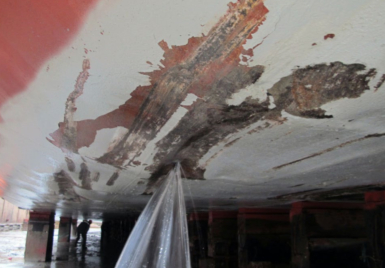
The Swedish Club has released details about a cargo fire caused by moving cargo due to inclement weather conditions. The case has highlighted the importance of detailed planning and discussions among Master, Chief Officer, technical manager or charterer, when it is about critical cargo operations.
The RoRo vessel was underway and expected to sail through heavy weather with up to Beaufort scale 10 winds and eight metre high waves. The cargo onboard consisted mainly of vehicles, containers and jerry cans with fuel on flat racks.
Before loading, the Chief Officer went ashore to inspect the cargo. He inspected the jerry cans that were secured with quick lashings through the handles of each row and secured to bars on the flat racks.
He was concerned that the jerry cans were placed on flat racks and not in containers, as there were no walls around the racks to protect the jerry cans. The flat racks and containers were Continue reading “Fire caused by moving cargo”










